Key takeaways:
- Anxiety during lockdown often stems from isolation and constant exposure to distressing news, making it essential to recognize personal triggers.
- Coping strategies like establishing routines, journaling, and limiting news consumption can help manage anxiety and create a sense of normalcy.
- Building a supportive routine, including dedicated work and relaxation times, contributes to mental wellbeing and helps alleviate stress.
- Long-term wellbeing involves maintaining social connections, nurturing relationships formed during lockdown, and exploring new hobbies for personal growth.
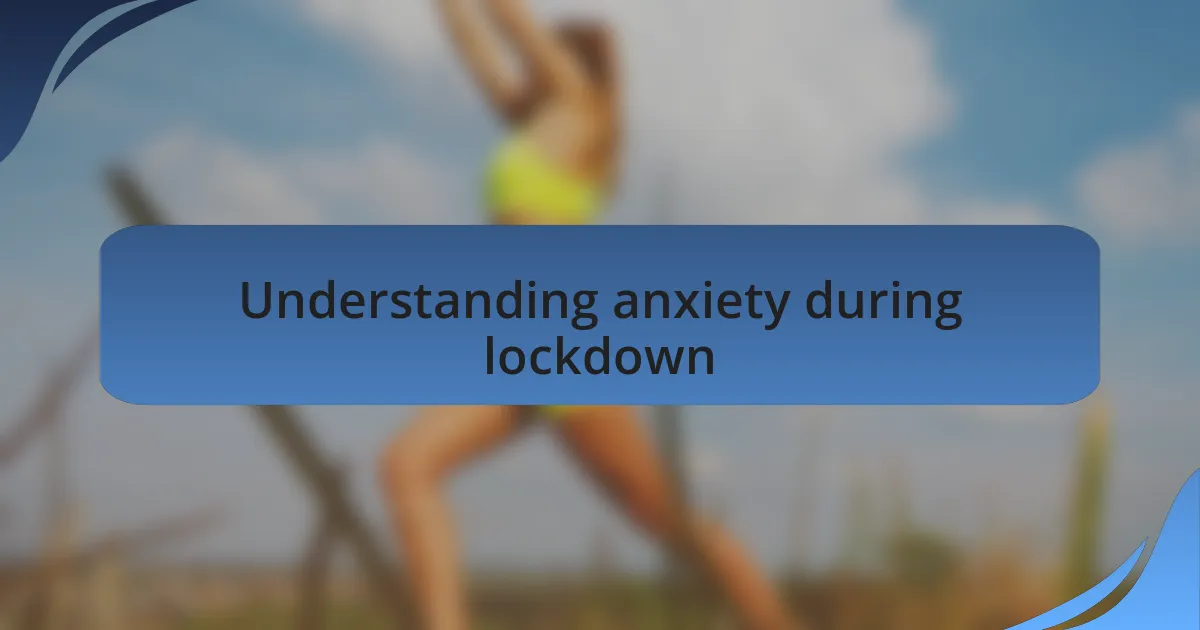
Understanding anxiety during lockdown
Anxiety during lockdown often feels like a shadow lurking in the corners of our homes. I remember lying awake at night, my mind racing with thoughts about the future. It made me wonder—am I the only one feeling this way? This sense of isolation can amplify fears and uncertainties, creating a heavy weight that many of us carry.
The constant news cycle didn’t help either. It seemed like every alert was another reminder of danger, feeding my anxiety and making it hard to separate fact from fear. Sometimes, I would catch myself scrolling endlessly, only to be left feeling more overwhelmed. How could I break this cycle and regain some control in overwhelming circumstances?
I discovered that understanding my triggers was essential. Reflecting on moments when my heart raced, especially after watching the news or being cooped up too long, helped me identify patterns. This process was enlightening—I learned that recognizing what stirred my anxiety was the first step to managing it. Have you taken time to notice your triggers?
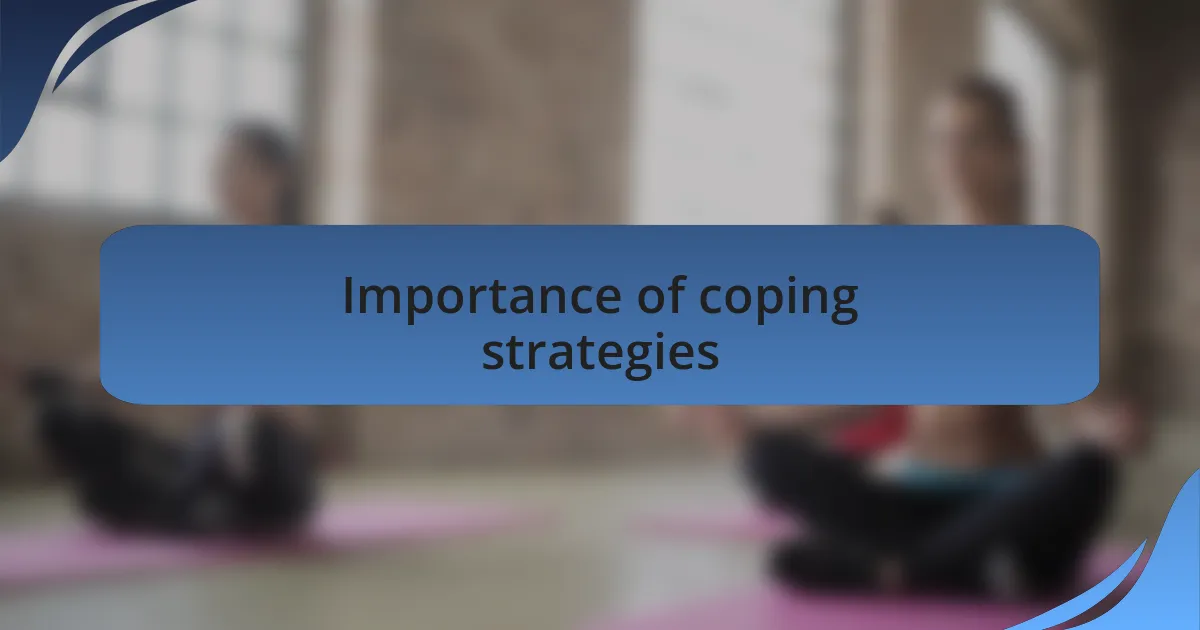
Importance of coping strategies
Coping strategies are critical during times of high anxiety, like the lockdowns we all experienced. I’ve found that when I establish a routine, it gives my day structure and helps me focus on small wins, such as starting each morning with a 15-minute meditation. Have you tried setting up your daily rituals? It’s amazing how these seemingly simple practices can create a sense of normalcy amidst chaos.
Different strategies work for different people. For me, journaling was a lifeline. It allowed me to unpack my thoughts and feelings without judgment. I often pondered—how often do we truly take the time to express what’s weighing us down? Writing those thoughts out transformed them from overwhelming clouds into manageable raindrops, making life feel less daunting.
The importance of coping strategies goes beyond individual relief; they can foster connections with others as well. Sharing my experiences with friends via video calls not only lightened my burden but also encouraged them to open up about their own struggles. When we talk about our coping methods, we create a community support network that is invaluable during tough times. How have you connected with others to navigate these feelings?
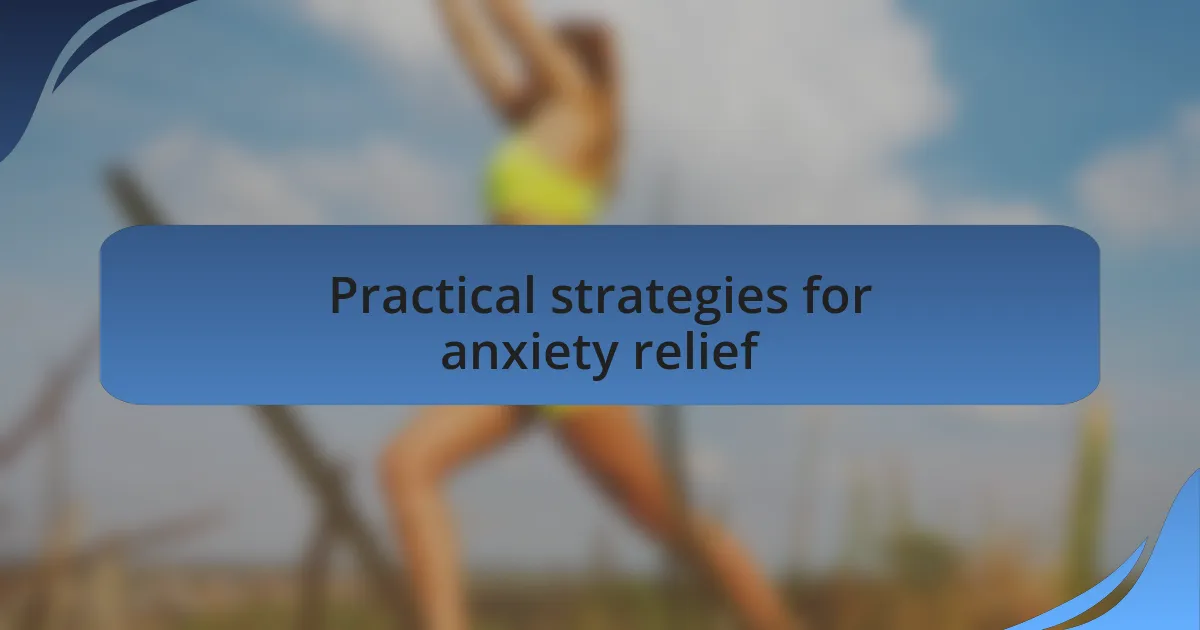
Practical strategies for anxiety relief
Finding balance was essential for me, especially during lockdown. I turned to yoga, a practice I never thought I would enjoy. Each session felt like a gentle nudge to reconnect with my body and mind, fostering inner peace. Have you experienced the calming effects of movement? It’s incredible how a few stretches can ground us when the world feels overwhelming.
Another technique that proved effective was setting boundaries around my news consumption. At first, I found myself scrolling endlessly, which only heightened my anxiety. Once I limited my news intake to specific times of the day, I felt a weight lift off my shoulders. It’s remarkable how freeing it can be to reclaim our time and focus on things that bring us joy instead.
I also discovered the power of creative expression. Painting or simply doodling was more than just a hobby for me; it became a mental escape. I recall one evening, losing myself in colors and shapes, forgetting the worries that once consumed me. Have you explored your artistic side? Engaging in creative activities can turn anxiety into something tangible, allowing us to process emotions in a healthy way.

Building a supportive routine
Establishing a routine became my anchor during lockdown. Mornings started with a simple ritual: brewing a cup of tea while journaling my thoughts. This small practice created a serene space where I could reflect, making the day feel more purposeful. Have you ever noticed how a morning routine can influence your mindset?
I also carved out dedicated blocks of time for work and relaxation, which helped me draw a line between productivity and unwinding. I remember a day when I worked non-stop for hours, only to feel drained and anxious. By scheduling short breaks and adhering to them, I found a satisfying rhythm that kept anxiety at bay. This balance between tasks and downtime is crucial, don’t you think?
Meal planning became another essential part of my supportive routine. I felt empowered by preparing healthy meals ahead of time, which eased the stress of decision-making during the week. The nights when I would cook this way felt nurturing—almost like an act of self-care. Can you see how fueling our bodies with good nutrition not only nourishes us physically but mentally as well?
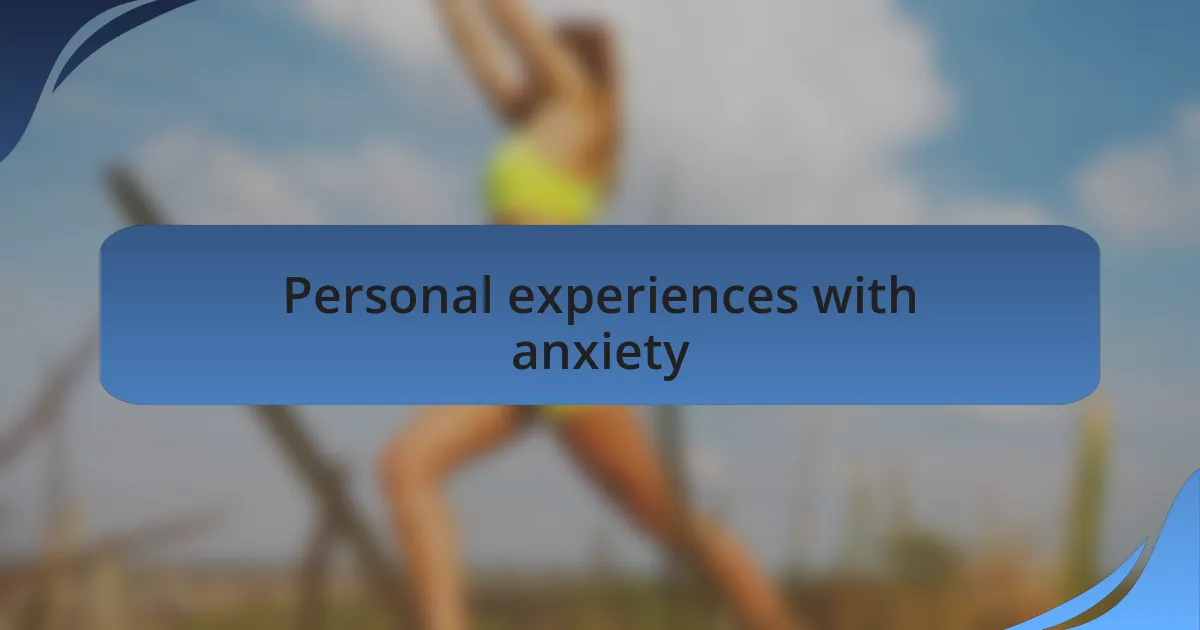
Personal experiences with anxiety
There were moments during lockdown when anxiety would wrap around me like a heavy blanket. I vividly recall one night when the weight of uncertainty kept me awake; my mind raced through countless what-ifs about the future. It’s strange how just acknowledging those feelings allowed me to breathe a little easier—almost like turning a light on in a dark room. Have you ever experienced that moment of clarity amidst chaos?
When the news hit, I’d often feel my heart racing as I scrolled through updates. One day, I decided to limit my media exposure, and what a difference it made! I began focusing on things that brought me joy, like digging into a good book or listening to uplifting podcasts. Those flickers of joy reminded me that my mental space mattered just as much as the world outside. Wouldn’t you agree that finding your happy moments is key to navigating anxiety?
I also learned that expressing my feelings was a powerful tool. I started sharing my thoughts with friends over video chats, and hearing their own struggles made me feel less isolated. The vulnerability in those conversations forged deeper connections, reminding me that we’re all navigating this storm together. How do you find comfort in connecting with others during tough times?
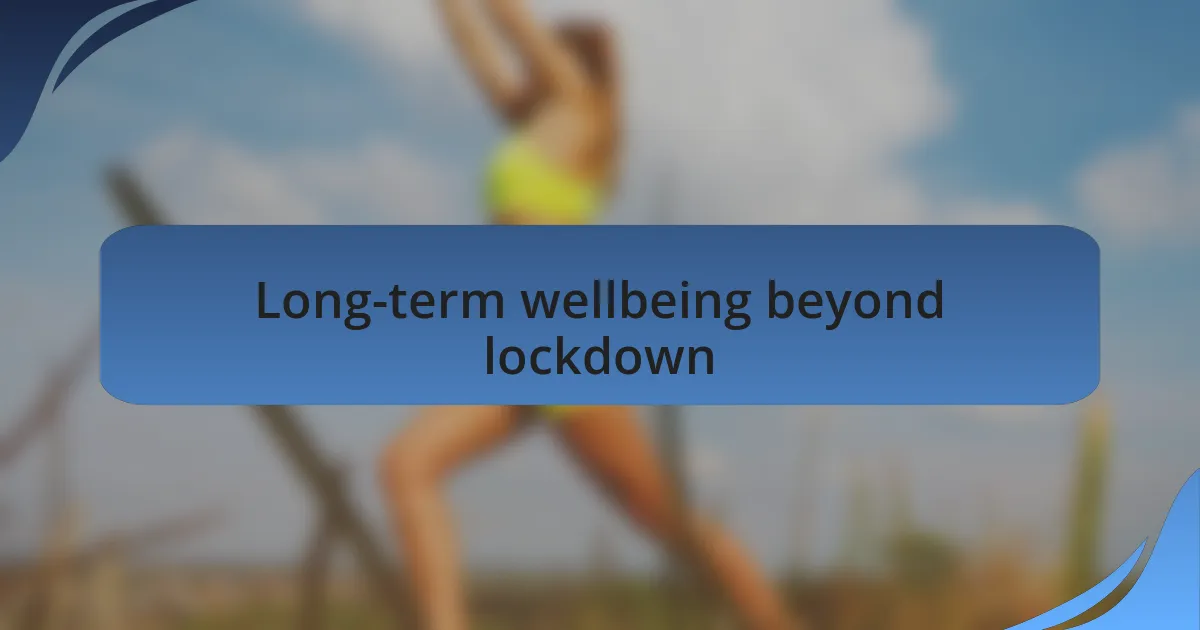
Long-term wellbeing beyond lockdown
Focusing on long-term wellbeing requires a commitment to self-care routines that extend beyond the chaos of lockdown. I discovered that journaling became my sanctuary; putting pen to paper helped me process my lingering anxiety. Have you ever tried writing down your thoughts? It’s like uncluttering your mind, enabling you to see patterns and triggers in your emotions.
As lockdown restrictions eased, I realized the importance of maintaining a network of support. I made it a point to schedule regular catch-ups with friends both virtually and in-person. Those moments acted like lifelines, reinforcing that our shared experiences during lockdown could lead to deeper, long-lasting friendships. Have you found that the relationships you nurtured during this time have changed in any way?
Embracing new hobbies also became a cornerstone of my long-term wellbeing strategy. I took up gardening, which not only grounded me but also offered a sense of accomplishment as I watched my plants thrive. How has picking up a new interest impacted your mental health? For me, these endeavors serve as reminders that growth is possible, even during the most challenging times.